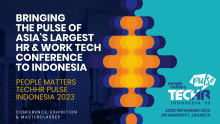Reimagining the future of work: Automation with humane capabilities

Chaos, disruption & rebirth. These unforeseen realities unspooled by the pandemic are an opportunity to reinvent work culture and restructure organizations. In an era of pink slips and abysmal economies, the sudden digital acceleration could be the ‘great equalizer’ for skilling, learning, employment, equality, diversity and inclusion for tomorrow. The conundrum is how does the ‘educators, employees, employer’s ecosystem’ prepare themselves?
The latest WEF Report projects that by 2025, 97 million new roles may emerge that are more adapted to the new division of labour between humans, machines and algorithms. So how do we ensure rights and livelihoods are protected, globally? By wearing multiple hats at work and exhibiting cross-functional skill sets, this requires massive curriculum rejig, Learning and Development initiatives to fill the skill gap, reboot and upskill the workforce and leaders.
The fourth industrial revolution was the first big indicator of change with collapsed boundaries of virtual and physical realities where communication, efficiency, productivity and consumer experience are significant. This has catalyzed reskilling, curiosity and agility to learn new skills—leading to the rise of the ‘Forever Learner.’ No wonder then, that global giants like Google, Intel and others are adopting Compensation structures and traditional performance management systems- OKR (Organization key result) that focus on short term measurables goals.
Therefore, educational institutions are revisiting curriculums to better cater to evolved workspaces, the employer HR function have also doubled their efforts in swiftly upskilling their employees to ensure learning while on the job. In this scenario, the role of private institutions/partnerships becomes the utmost priority in diversifying opportunities for future Indian professionals. The winds of change are manifesting via global exposure through ingress of foreign education players, hybrid learning platforms to enhance employability. On an organizational scale, HR functions in big corporates and tech giants are partnering with several universities for upskilling and realigning their strategies to meet the demands of this changing landscape.
Let’s envisage the future roadmap to these changes---
Talent Acquisition for the future
In my estimation, being adept with technology along with empathy driven leadership, will be a big plus to power any industry or nation ahead. Here are some skills to consider:
- Workplace skills - Ability to work in a team that you have not seen, playing a team game without knowing the team is pivotal to the workplace. Work ethics and discipline are equally significant. Besides these, competencies like self-management, emotional intelligence, resilience, flexibility, ability to deal with pressure, critical thinking, risk management, multi-tasking are much-in-demand.
- New-reality Skills - Ability to take initiatives, good listener, agility, teamwork, creativity, negotiation and persuasion, kindness, gratitude, mindfulness.
- Rise of the gig workforce - Talent can find its way in the worst of time. The age of pink slips has given birth to gig roles where highly experienced and talented professionals are being hired on short-term contracts and bring the same learning & value, as a long-term employee.
Revising Rules of the game: Skill Reboot
Though the work-from-home scenario has skewed work-life balance, it has opened virtual doors to conversations and initiatives on virtual learning, upskilling, mental well-being and most significantly the genesis of new roles that we couldn’t predict some months ago. ‘Humane’ leadership and employees have disintegrated siloed careers, talent recruitment and leadership approaches. These changes around us are an indicator that the future of work –whether physical, virtual or hybrid—will be people-powered.
Amid these changes, organizations are going full throttle on employee engagement, autonomy and culture as these are the key reasons prospective employees choose them.
Renewal: Skill development & Reboot
There’s always value and progress in upskilling with the right kind of employee engagement. This learning has been highlighted in the pandemic. Here’s how organizations can un-learn, re-learn and learn:
- Smart Analysis & Mapping: This requires consideration of key questions like—Are the old ways still relevant now and in the future? What are the changes and new trends in the industry that need adaptation? How will it impact the existing ecosystem and what strategies can be evolved to leverage these changes? How will it impact the business and workplace culture, going ahead? Why not upskill the existing workforce instead of dispensing it?
- Designing competency models and learning from training modules: It’s important to track the growth trajectory in the pre-training and pro-training session of employees to evaluate their progress. Identify what needs immediate course correction or redressal and the requisite process & tools to initiate a smooth transition for a skills upgrade. Identifying the right trainers and facilitators of this process –how it should be designed and executed.
- Match competencies with careers: Every individual has his unique talent which contributes to the organizational structure and goals. But that’s not always met. An important lesson taught by the pandemic is that we need to value every talent and ensure there is no gap between competence and role. It’s only possible with well-defined meaningful roles that go all the way up based on merit and soft skills. Perhaps this explains why organizations across the world are now witnessing restructuring and adoption of newer processes.
What’s Next for the future of work? In my opinion, it will be structureless--based on knowledge sharing, efficient outputs from fluid spaces that could be physical, virtual or hybrid. And, fast, furious, fun is the way to be!














